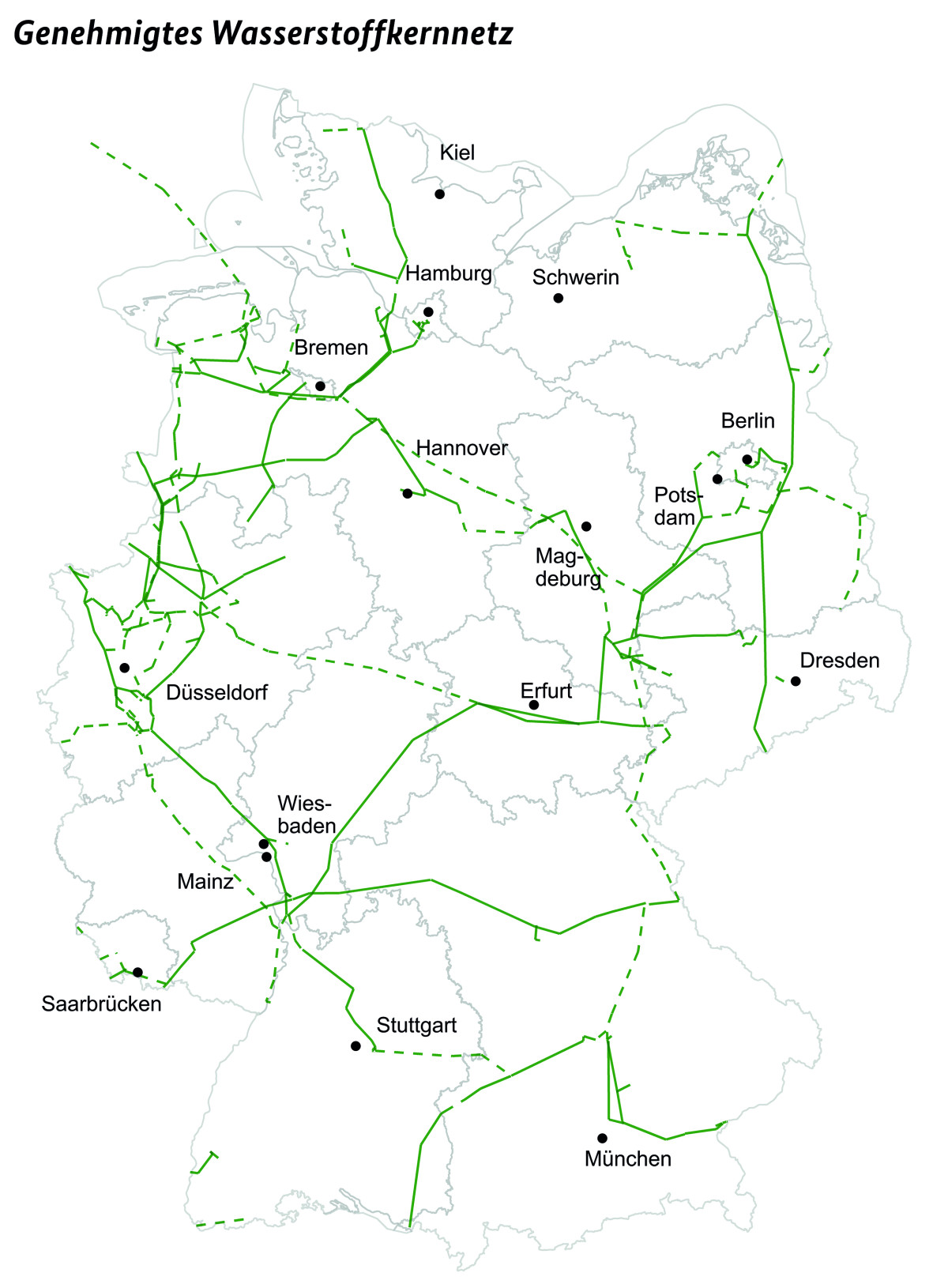Hydrogen to start to flow in pipelines in Germany in 2025
Germany is set to see the first hydrogen flow in pipelines in 2025 following approval of the country's hydrogen "core grid" by the Federal Network Agency (BNetzA). "The first hydrogen pipelines of the core grid will go into operation as early as next year," economy minister Robert Habeck said during a press conference. "The core grid is the starting point for a new infrastructure and a central component of the energy transition. This makes Germany a pioneer in Europe."
The core grid is set to be completed by 2032 and will cost nearly 19 billion euros. It will be made up of 9,040 kilometres of pipeline that will be finalised over the next few years. That is about 600 kilometres less than in the initial approval application – a reduction Habeck said will keep grid fees down.
All federal states will be connected to the network, which will link the focal points of hydrogen production, consumption, storage and import. Habeck likened the hydrogen grid to the autobahn (Germany's motorway), saying that the big arteries had to be built first, with smaller feeder roads connecting companies and power plants coming later.
More to come
The grid – a key part of the country's plans to reach net-zero by 2045 – "will now be built,” Habeck said, adding that his ministry had taken the project from idea to approval in "record" time. That is despite criticisms that the process has been too slow.
Around 60 percent of the grid will be converted gas pipelines and 40 percent will be newly built. Only pipelines no longer needed for transportation of the fossil fuel will be converted, while an extra 2 billion euros will be invested in additional gas pipelines to ensure security of supply, said BNetzA head Klaus Müller at the press conference.
The BNetzA plans to present a network development plan for electricity, gas and hydrogen in the summer, detailing which cities and municipalities will be further connected, Tagesspiegel Background reported.
Energy industry welcomes approval
Germany's National Hydrogen Council, an independent government advisory body, welcomed the BNetzA's approval, saying it was an "important signal" for the green energy transition that would help make Germany a pioneer in hydrogen infrastructure.
Energy industry association BDEW called the approval "a milestone" and an "important signal" for all wanting to produce or use hydrogen in the future. "The hydrogen ramp-up can only succeed with a well-developed network," BDEW head Kerstin Andreae said.
German Energy Agency (dena) head Corinna Enders also called the approval a "landmark decision".
"The approval is an important signal for all players involved in the hydrogen market ramp-up: there is now clarity about where hydrogen pipelines will be located in the transmission network in the future – and where not," she said. "Today's approval of the core network is groundbreaking in terms of breaking the mutual wait-and-see approach to investment decisions."
Southern states feel left behind
Nicole Hoffmeister-Kraut, economic affairs minister in the southern state of Baden-Württemberg, criticised the plans, saying that large parts of the state continue to be ignored despite a fifth of the country's industrial value creation taking place there. "If one of the economically strongest federal states is neglected in this way, Germany's economic strength as a whole will be jeopardised," she said.
Andreas Jung, climate and energy policy spokesman for the CDU/CSU parliamentary group, called the plans a "a low blow to the south and a bitter disappointment", adding that the core grid had "a glaring north-south skew".
A July survey by business daily Handelsblatt found that industry in southwestern Germany worried it would be left behind as planning for the country's core hydrogen grid advanced, with regional chambers of industry and commerce fearing they will not be able to participate in the transition.
Hydrogen to play central role in Germany's future energy mix
In the fight against climate change, hydrogen made with renewable electricity is seen as essential for the decarbonisation of sectors with particularly stubborn emissions, such as heavy industry and aviation.
Germany has set out to become a global leader in the associated hydrogen technologies, and the government has penned a National Hydrogen Strategy to achieve these ambitions. The country will largely have to import the fuel in future due to unfavourable local conditions for renewable electricity production.
However, a recent report by environmental think tank Wuppertal Institute said that many states will focus on ramping up production for domestic demand first. The report suggested Germany needed "more in-house production" of hydrogen, while at the same time bolstering global alliances. The authors called for an increase in cooperation across Europe to expand the H2 economy.


